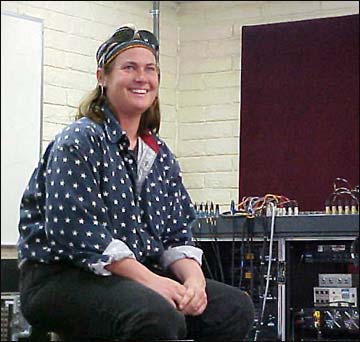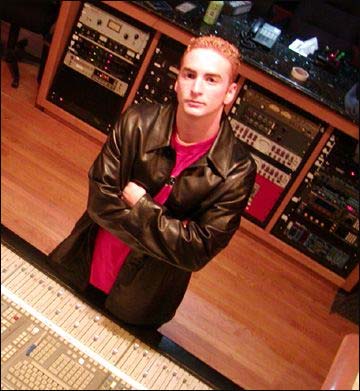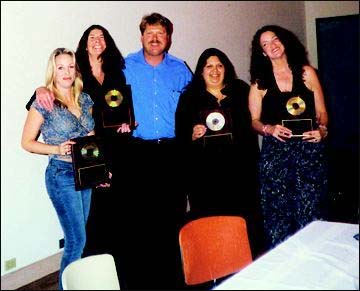EveAnna Manley Visits Conservatory

Manley is to tube gear as Sterling is to silver. Their signature gear such as the VoxBox, Stereo Pultec EQP1A and Variable MU compressor/limiter is found in the racks of major studios all over the world, not to mention the racks at the Conservatory of Recording Arts. The newly expanded Chino, California-based manufacturing firm not only makes their own line of audio gear for studio and audiophile use; they also manufacture George Massenburg's renowned GML line of audio products. EveAnna Manley owns the whole operation, which employs more than 40 people and is about to expand beyond their current 11,000 square-foot facility.
Manley recently visited the Conservatory campus in Tempe to talk to the students about tube gear and the path that her career has taken. "I thought the facility was impressive and it was great talking to the students," said Manley of her visit to the campus. In her talk to the students, Manley emphasized high quality, service, and organization as the key to success in her business. "The kids were very attentive and it was a great audience to talk tubes to," said Manley. "I get a lot of requests to talk to recording schools, but I don't usually have the time; I'm glad I had a chance to visit the Conservatory and talk to these students about what it's like to work in audio."
Manley is a true Renaissance woman who can perform many of the tasks in the factory from soldering printed circuit boards to creating circuit designs. The Columbia University grad started working for, and eventually marrying, the company's founder David Manley back in 1989. Since then, she bought the company and has grown it into the U.S. tube gear powerhouse it is today.
The students got an insider's view of audio manufacturing not often afforded to up-and-coming audio pros. For instance, who would guess that there is great difficulty in finding tubes for specific products because of limited manufacturing and because of events such as the war in Yugoslavia? Manley also profiled how they test tubes for different qualities depending on the application. It was also ironic that she talked about her dislike of heavy compression in the mastering stage of CD production, even though her products are probably the most responsible for this. "We're making guns, not pulling triggers" was her pithy answer to that indictment.
EveAnna Manley joins a growing list of audio luminaries who have visited the campus including; console guru Rupert Neve, engineers Mike Farrow, Mike Sokol and others.
Josh Weaver is Tone

Networking is important if you want to make it in any business and Conservatory grad Josh Weaver (also known as Tone) knows this first-hand. Weaver parlayed his attorney/contact into a gig at Studio 880 in the Bay Area. The attorney contacted Studio 880 owner John Lucasey who was looking for an audio-savvy employee. "Good talent is hard to find," says Lucasey. So I gave this kid, Josh Weaver, a chance as an intern. I told him how it was going to be. Recognition and success doesn’t come easy. He understood."
Since graduating from CRAS, fulfilling a six-month internship, and then working full-time at Studio 880, Tone has become a freelance engineer, working with such acclaimed artists as Santana as well as producing local Bay Area bands. Tone adds that what has to be the biggest trip of his career to date was working with Green Day on their CD Warning. The band was so happy with him and liked him so much that Tone can be heard being whipped by a dominatrix in the beginning of the song "Blood, Sex, and Booze". He can also be seen in the 20-minute Warning CD-ROM release.
One of the biggest changes since Josh graduated from the school is his name. Lucasey explains Josh's new moniker: "One day he was practicing getting sounds on the console, and I kept shouting, ‘It’s all in the Tone, go for the fat Tone.’ Then whenever I walked in the room I would just say ‘tone’ to get him to work on sounds. After a while, we just titled him 'Tone’, and it stuck!"
At the Conservatory, Josh learned by doing, which in turn prepared him for the real-world opportunities that appeared after graduation. Lucasey explains: "The Conservatory of Recording Arts & Sciences taught him about the real world. No matter how much or little you know, SHUT UP AND LISTEN! You must pay your dues, and you always start at the bottom. We’ve had a couple other students from the Conservatory intern here because we REALLY like the attitude of the students that come out of there. They learn on top-notch gear, but know they have to climb their way to the top. They have a fighting chance because they know what they are getting into."
Tone agrees. "I'd say the biggest thing I learned at the Conservatory was that you're not an engineer just because you graduate from school. It usually takes a long time to become successful in this industry and more often than not you're going to end up paying some dues. All of the instructors at the Conservatory hit on that constantly. As far as the technical side of things, the Conservatory gave me a strong foundation for working in the real world, such as teaching us on equipment that we will use to eventually earn a living, such as SSL, Tascam, Hafler, and Pro Tools. I'd recommend the Conservatory to anyone who's serious about pursuing a career in audio engineering. The instructors are all great and very supportive in trying to help others succeed in the music industry."
Josh Weaver is well on his way to a promising career in audio and it seems that both he and his new boss have both learned something from their interaction with the Conservatory: The importance of Tone.
Photo caption: Tone (a.k.a. Josh Weaver) in the control room at Studio 880
Top L.A. Studio Managers Visit CRAS

In order to give students an advance real-world glimpse of what goes on in the professional audio world, the Conservatory of Recording Arts & Sciences recently played host to four Los Angeles studio managers as part of the school’s ongoing guest lecture program.
On March 22, 2002 Jane Scobie from Royaltone Studios, Candace Stewart from Cello Studios, Diana Nitz of Front Page Recorders and Michele Moore from Studio Atlantis visited the school and participated in a panel discussion and seminar on audio internships. Each manager gave a short talk on their views of the business and then fielded questions from students. Topics ranged from what a student could look forward to during their internships, to the importance of attitude and people skills.
The staff at the Conservatory knows how important it is that students understand what it truly takes to succeed once they leave the school. With the guest lecture from the managerial mavens, students got a strong dose of reality from representatives of facilities that they couldn’t help but respect. "The feedback from the students was very positive; the consensus was that they got an honest reality-based view of what they could expect after graduation," says Conservatory Administrator Kirt Hamm. "It is important to reinforce what we tell the students on a daily basis by having industry professionals share their views. This seminar not only established and reinforced our relationships with the industry but it gave students an idea that the preparation we stress here it the school is founded in reality."
Photo caption: (left to right) Michele Moore, Studio Atlantis;
Jane Scobie, Royaltone Studios;Kirt Hamm of the Conservatory;
Diana Nitz, Front Page Recorders, Candace Stewart, Cello Studios.




Visit the Headline Archive - See student and faculty profiles, facility spotlights, news and more.
Apply To The Conservatory Online - Our easy-to-use online admissions form makes it simple to get a Conservatory education.
|

